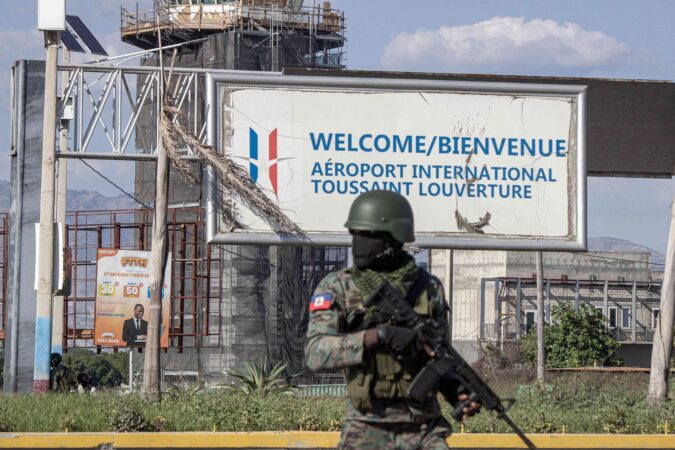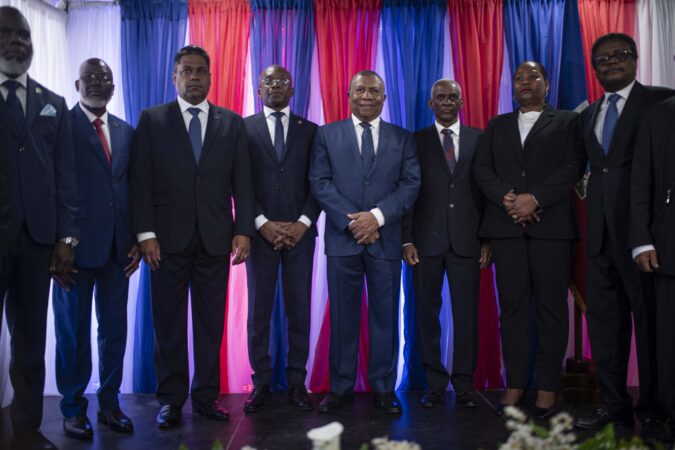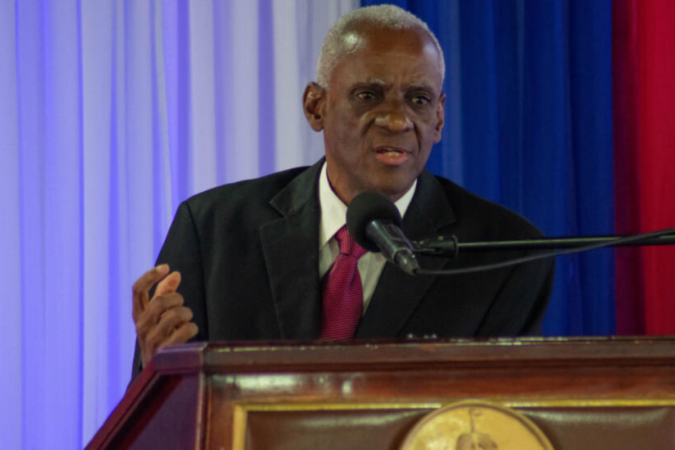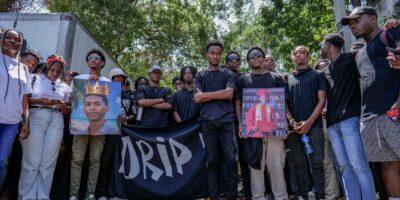Despite recent statements highlighting recent positive political developments, Haiti remains on the edge of a cliff with the potential for a disastrous spillover effect into the region
The situation in Haiti remains grim despite the formation of a Transitional Presidential Council (TPC), the nomination of a new Interim Prime Minister, Garry Conille (a former senior United Nations official), and the expected deployment of the Kenyan-led Multinational Security Support (MMS) Mission.
The international airport in the capital reopened for commercial traffic on May 20 after being closed for almost three months; US airlines have just resumed their flights. Gang activity is rampant in Port-au-Prince, which remains under lockdown.

A soldier of the Armed Forces of Haiti (FADH) monitoring the entrance of the airport in anticipation of the rumor regarding the potential return of the then-de facto Prime Minister, Ariel Henry. | © Jean Feguens Regala/AyiboPost
Southern parts of the country affected by the 2021 earthquake are inaccessible from the capital due to the risk of extortion, abduction, and gang violence. Gangs also threaten sea routes, hindering economic activities.
With nearly 3,300 officers lost in the past three years due to killings or resignations, the police force has suffered significant losses.
Read also: Police officers desert the streets of Port-au-Prince
Owing to this harsh environment, many Haitians leave the capital and relocate to other cities, particularly in the northern part of the country, such as Cap-Haitien or the countryside. If thousands of Haitians have not left for the shores of Florida, many have already arrived in neighboring countries like the Dominican Republic and Mexico.
There are growing concerns that neither the Transitional Council nor the Multinational Force will stabilize the situation and create a conducive environment for holding credible elections; and it is uncertain whether a proper contingency plan has been developed. With heavily armed gangs operating in the country, the situation could indeed deteriorate rapidly as gang leaders continue to resist the State, and publicly vow to fight the Multinational Force.
If Port-au-Prince has recently experienced relative calm in terms of security, allowing schools to resume their activities; there have been targeted attacks on police stations in the capital, notably in Croix-des-Bouquets and Gressier, as well as on civil prisons like the one in Titanyen. These incidents suggest that the gangs are in fact willing to confront the Multinational Force.
Read also: Exclusive | Izo Builds a Wharf in Preparation for the Kenyans
Political Dynamics
From the political facilitation led by the Caribbean Community (CARICOM), a Transitional Presidential Council has been established, albeit with significant delays. The Council is a collegial body exercising specified presidential powers until a new president is elected by 2026. It comprises 9 members, 7 of whom have voting rights, while the others do not.

Members of the Presidential Council take part in a photo opportunity during the ceremony of their installation on April 25, 2024 at the Villa d’Accueil, in Musseau. | © Pedro Anza for AyiboPost
As proposed by CARICOM, they represent the main political sectors, including the former government and its opposition, civil society organizations, and the private sector. Local stakeholders have already criticized its lack of inclusiveness, as it notably fails to include representatives from the main religious churches per se, such as the Catholic and Protestant ones, despite the presence of an Interfaith representative.
Although the main political and civil society groups are involved, some Haitian scholars have observed that Haiti has previously endeavored seven presidential councils, all of which were unsuccessful. The different political forces making up the Council have conflicting interests, which has already led to internal disputes after the former presidential candidate and head of the Senate, Edgard Leblanc Fils, was appointed as president/coordinator on April 30.
Read also: The Haiti presidential council in turmoil
An agreement on a rotational presidency is now in place, as well as a decision-making process requiring a five-sevenths majority vote, which could prove challenging.

The current President of the Presidential Transition Council (CPT), Edgard Leblanc Fils, in April 2024, at the Villa d’Accueil, in Musseau.
Likewise, criticisms from the Montana group and parties formerly in opposition to Henry (referred to as the « coalition of January 30 ») have emerged in the context of negotiations for the formation of a new government, where political affiliations have taken precedence over qualifications in the Cabinet’s appointment.
Tensions are expected to escalate further during the appointment process for the leadership of key administrations. This situation is reminiscent of past efforts, namely agreements brokered by former Prime Minister Ariel Henry on September 11, 2021, and December 21, 2022; which did not lead to tangible actions like constitutional reform or credible elections.
Finally, the Council may encounter a revived opposition from gang leader Jimmy Cherizier, also known as « Barbecue, ». It also faces a potential resistance from Guy Philippe, a retired police officer and politician who led a coup in 2004 against then-President Jean-Bertrand Aristide. He was later convicted and served time in a US federal prison for conspiracy to money laundering, and attempted to overthrow Ariel Henry last February. Both Cherizier and Philippe claim that the Council is unconstitutional and imposed from the outside.
Which Multinational Force on the Horizon?
The U.N. Security Council authorized the Multinational Support Security Mission (MSS) nine months ago, on October 3, 2023, for one year. Its deployment was temporarily blocked by the High Court in Nairobi’s decision on January 26, 2024, stating that Kenyan police forces could not be deployed without a reciprocal arrangement, as per the Kenyan Constitution and the Kenyan Defense Forces Act. The Court reminded that Kenya could only deploy defense forces, not security services. In response, the Kenyan government signed a reciprocal agreement with former Prime Minister Henry on March 1, 2024.
Read also: The case of Kenya’s intervention in Haiti reveals a flaw in the Kenyan Constitution
The Kenyan opposition continues to oppose the deployment, as it was previously deemed unconstitutional. They have once again filed a case to be adjudicated end of June and have warned that they are ready to bring the matter to the Kenyan Supreme Court. If the Kenyan government is willing to abide by the judicial process, the deployment of its troops could be further delayed until the U.N. Security Council ultimately decides to select a new country to lead the mission. The U.N. Security Council is expected to review the mission within nine months following authorization, according to its resolution 2699. This means that a review should take place in June.
If the Kenyan government is willing to abide by the judicial process, the deployment of its troops could be further delayed until the U.N. Security Council ultimately decides to select a new country to lead the mission.
Due to US commitments to provide necessary support and funding, and diplomatic efforts to obtain U.N. Security Council authorization, one of the pre-conditions posed by CARICOM for joining the Transitional Council was to accept the deployment of the Multinational Force.
Yet, any past arrangements between Haiti and Kenya made by Ariel Henry must be reviewed, including those related to the signed memorandum of understanding, the concept of operations, the use of force (which refers to police operations) and/or rules of engagement (relating to potential military operations due to the likely presence of military personnel within the Multinational Force). The aforementioned documents remain undisclosed, have yet to be finalized, and lack sufficient detail. During the U.N. Security Council meeting on Haiti on April 22, 2024, Russia – who abstained from voting in favor of the deployment – noted the absence of clarity in these documents. Similar complaints have also been made by U.S. Congress Republicans.
In response to the brutal assassination of two US missionaries by a gang in Haiti, both the US and Kenya have reaffirmed their intention to swiftly deploy a mission. Kenya will take the lead, with the Pentagon providing overall guidance. However, the mission is expected to encounter challenges in quickly expanding its operations.
At least 4,000 troops (possibly more due to staff rotation) will be required to effectively support the national police forces across the country. Currently, Haiti officially has 9,000 officers (around 6,500 according to local human rights advocates) serving on any given day for a population of 11 million, which is only one-third of the forces recommended by the U.N. for a country of that size. Additionally, some of these officers are reportedly collaborating with criminal gangs, emphasizing the need for the continuous vetting of the national police forces and the potential risks that international police will face when working with them.
Read also: Gangs hack into Haitian National Police communication radios
The mission is furthermore underfunded, with an estimated budget of $600 million over two years. Pledged contributions, including the United States ($300 million), mainly cover logistics, communication, and training, but are insufficient to adequately compensate the police forces to be deployed. Yet, media reports confirm that these forces’ primary motivation is to earn money.
According to the BBC, many Kenyan police officers are hesitant to operate in Haiti due to the gangs’ advanced weaponry, more sophisticated than their own. The Bahamas, Bangladesh, Benin, Chad, and Jamaica are considering joining the mission, with Benin pledging 1,500 « seasoned » soldiers, potentially increasing to 2,000. The latter may only consist of newly and insufficiently trained recruits, as Benin needs experienced troops to deal with security threats from jihadists on its border. The US is reportedly hesitant to contribute to the salaries of these soldiers due to concerns about their effectiveness.
Some countries in Latin America have the capacity to provide experienced troops. However, they are unwilling to do so because the mission will not be a U.N. operation, even though it has been authorized by the U.N. Security Council. The security environment is deemed too risky due to the unclear concept of operations. Adding to the risk, the presence of children and teenagers within the ranks of the gangs, as well as the failure to enforce the arms embargo and to sanction political and business leaders connected to the gangs.
Some countries in Latin America have the capacity to provide experienced troops. However, they are unwilling to do so because the mission will not be a U.N. operation, even though it has been authorized by the U.N.
Due to the limited number of national police officers available and the challenges in deploying more international troops, the US has been considering equipping the Haitian Army (Fad’H), which was disbanded in 1995, but reinstated in 2017. The army has assisted the police forces in combating gangs and securing port facilities.
Yet, there is a need for more information on its exact strength (reportedly around 1,500), recruitment, vetting processes, and rules of engagement, to ensure coordination and prevent overlap with the police force. It is worth recalling that the Multinational Force authorized by the U.N. Security Council does not foresee any support to the army (only to the police), and that in the recent past, some former military personnel joined a service brigade called BSAP (“Brigade de Sécurité des Aires Protégées”), which later supported Guy Philippe during his attempted coup against former Prime Minister Henry.
In the current environment, the Transitional Council is facing an enormous challenge in dealing with over 250 gangs, which includes the G9 group led by Jimmy Cherizier, as well as groups led by Johnson André (also known as Izo) and Vitel’Homme Innocent. While the number of gang members may not exceed 6,000, they are familiar with the terrain and can quickly recruit from a population whose more than 1.4 million people are on the brink of famine.
Some notable actors, such as Sir Ronald Sanders, the Ambassador of Antigua and Barbuda to the Organization of the American States (O.A.S) and the US, have suggested initiating a dialogue with the gangs and offering amnesty, while others, such as Jacky Lumarque, the rector of Quisqueya University, advise against the latter, as it might be seen as rewarding criminal behavior. However, it is essential to investigate alleged ties between the gangs and certain business and political leaders, and to appropriately punish those involved. This means that the Transitional Council must be able to restore a functioning criminal justice system and ensure that Haiti’s courts enforce the sanctions imposed by the U.N. against gang leaders.
Watch this explanatory video from AyiboPost addressing the concept of amnesty in the Haitian context:
Back-Up Plan Already?
Former US diplomats, including James Foley, who served as the US ambassador to Haiti from 2003-2004, have publicly expressed doubts about the effectiveness of the Transitional Council and the Multinational Force’s support to the national police in Haiti. They are convinced that the US Administration will be unable to afford any longer the persistent instability near its borders, and anticipate that the US will eventually have to intervene forcefully to bring stability to Haiti. General Laura Richardson, commander of the US Southern Command (SOUTHCOM), even revealed this March that the US had been contemplating sending military forces to Haiti as part of an « international solution that considers the perspective of Haiti. » This option has not yet gained favor with the White House.
In the meantime, various Haitian stakeholders, including political leaders from across the political spectrum, such as civil society groups, and religious organizations, have advocated for an alternative transition plan. Based on the provisions of the non-amended version of the 1987 Constitution, they suggest that a senior judge from the Court of Cassation take on the role of President, similar to what happened in 2004.
General Laura Richardson, commander of the US Southern Command (SOUTHCOM), even revealed this March that the US had been contemplating sending military forces to Haiti as part of an « international solution that considers the perspective of Haiti. »
– Laura Richardson
Retired US Army Lieutenant General Russel Honoré, who commanded relief efforts in the aftermath of Hurricane Katrina in New Orleans in 2005, mentioned this idea as a contingency plan in a March 28 letter to the White House on behalf of several Haitian diaspora organizations in the US.
Conversely, other organizations in the diaspora, such as Defend Haiti’s Democracy, point out that the non-revised 1987 Constitution provides an investiture by the parliament, which is absent today. They stress that the judges of the Court have sworn on the revised version of the Constitution. Under such conditions, they recommend still privileging a political solution by consensus, an approach supported by some signatories of the former pro-Ariel Henry December 21, 2022, agreement.
Other local observers recall that the current judges of the Court of Cassation were nominated by former presidents Michel Martelly and Jovenel Moise, or by Henry; and speculate that any selected judge may end up a proxy for the former leaders rather than the independent voice these groups feel is needed. Nevertheless, this proposal remains on the table and poses another perceived political threat to the Transitional Council, which is bound to succeed if it wants to survive.
The possible outcomes of the ongoing crisis and power vacuum in Haiti seem limited. These include a takeover by Guy Philippe with the support of gangs, a political transition led by a senior judge from the Court of Cassation as the President, similar to the scenario in 2004, or a transitional leadership by the current or a revamped Council. Some of these outcomes may seem like the « lesser of two evils, » as they could be more appropriately aligned with a law enforcement solution and the reestablishment of the rule of law.
Read also: Concern over police impunity in Haiti ahead of multinational intervention
Despite recent statements highlighting recent positive political developments, Haiti remains on the edge of a cliff with the potential for a disastrous spillover effect into the region. Let’s hope that this cliff is not too steep and that there is an overall awareness and commitment to surmount these obstacles.
► By Philippe de Bard, independent analyst and expert on Haiti. He has worked with the United Nations and the European Union as a chief technical advisor and a senior political and electoral analyst for more than two decades.
Cover image : A man and a little girl trying to flee the lower part of Delmas targeted by armed bandits. Jean Feguens Regala/AyiboPost
Keep in touch with AyiboPost via:
► Our channel Telegram : Click here
► Our Channel WhatsApp : Click here
► Our Community WhatsApp : Click here







Comments